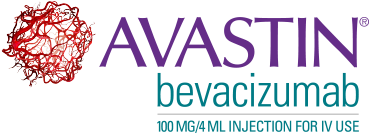Indication
Metastatic Colorectal Cancer (mCRC)
Avastin is approved to treat metastatic colorectal cancer (mCRC) for:
- First- or second-line treatment in combination with intravenous fluorouracil–based chemotherapy
- Second-line treatment when used with fluoropyrimidine-based (combined with irinotecan or oxaliplatin) chemotherapy after cancer progresses following a first-line treatment containing bevacizumab
Avastin is not approved for use after surgery was used as the primary treatment in patients with colon cancer which has not spread to other parts of the body.
Non–Small Cell Lung Cancer (nsNSCLC)
Avastin, in combination with carboplatin and paclitaxel, is approved to treat advanced nonsquamous non–small cell lung cancer (NSCLC) in people who have not received chemotherapy for their advanced disease.
Glioblastoma (GBM)
Avastin is approved to treat glioblastoma (GBM) in adult patients whose cancer has progressed after prior treatment (recurrent or rGBM).
Metastatic Kidney Cancer (mRCC)
Avastin, used with interferon alfa, is approved to treat metastatic kidney cancer (mRCC).
Advanced Cervical Cancer (CC)
Avastin, in combination with paclitaxel and cisplatin or paclitaxel and topotecan, is approved to treat persistent, recurrent, or metastatic cancer of the cervix.
Ovarian Cancer (OC)
Avastin, in combination with carboplatin and paclitaxel, followed by Avastin alone, is used for the treatment of patients with advanced (Stage III or IV) epithelial ovarian, fallopian tube, or primary peritoneal cancer following initial surgery.
Avastin, in combination with paclitaxel, pegylated liposomal doxorubicin or topotecan, is approved to treat platinum-resistant recurrent epithelial ovarian, fallopian tube or primary peritoneal cancer (prOC) in women who received no more than two prior chemotherapy treatments.
Avastin, either in combination with carboplatin and paclitaxel or with carboplatin and gemcitabine, followed by Avastin alone, is approved for the treatment of patients with platinum-sensitive recurrent epithelial ovarian, fallopian tube, or primary peritoneal cancer (psOC).
Hepatocellular Carcinoma (HCC)
Avastin, in combination with atezolizumab, is indicated for the treatment of patients with unresectable or metastatic hepatocellular carcinoma (HCC) who have not received prior systemic therapy.
Important Safety Information
Possible serious side effects
Everyone reacts differently to Avastin therapy. So, it's important to know what the side effects are. Although some people may have a life-threatening side effect, most do not. Your doctor will stop treatment if any serious side effects occur. Be sure to contact your health care team if there are any signs of these side effects.
- GI perforation. A hole that develops in your stomach or intestine. Symptoms include pain in your abdomen, nausea, vomiting, constipation, or fever
- Abnormal passage in the body. This type of passage—known as a fistula—is an irregular connection from one part of the body to another and can sometimes be fatal
- Wounds that don't heal. A cut made during surgery can be slow to heal or may not fully heal. Avastin should not be used for at least 28 days before or after surgery and until surgical wounds are fully healed
- Serious bleeding. This includes vomiting or coughing up blood; bleeding in the stomach, brain, or spinal cord; nosebleeds; and vaginal bleeding. If you recently coughed up blood or had serious bleeding, be sure to tell your doctor
- Severe high blood pressure. Blood pressure that severely spikes or shows signs of affecting the brain. Blood pressure should be monitored every 2 to 3 weeks while on Avastin and after stopping treatment
- Kidney problems. These may be caused by too much protein in the urine and can sometimes be fatal
- Infusion-related reactions. These were uncommon with the first dose (less than 3% of patients). 0.4% of patients had severe reactions. Infusion-related reactions include high blood pressure or severe high blood pressure that may lead to stroke, trouble breathing, decreased oxygen in red blood cells, serious allergic reactions, chest pain, headache, tremors, and excessive sweating. Your doctor or nurse will monitor you for signs of infusion-related reactions
- Severe stroke or heart problems. These may include blood clots, mini-stroke, heart attack, chest pain, and your heart may become too weak to pump blood to other parts of your body (congestive heart failure). These can sometimes be fatal
- Nervous system and vision problems. Signs include headache, seizure, high blood pressure, sluggishness, confusion, and blindness
Side effects seen most often
In clinical studies across different types of cancer, some patients experienced the following side effects:
- High blood pressure
- Too much protein in the urine
- Nosebleeds
- Bleeding
- Back pain
- Headache
- Taste change
- Dry skin
- Inflammation of the skin
- Inflammation of the nose
- Watery eyes
Avastin is not for everyone
Talk to your doctor if you are:
- Undergoing surgery. Avastin should not be used for 28 days before or after surgery and until surgical wounds are fully healed
- Pregnant or think you are pregnant. Data have shown that Avastin may harm your unborn baby. Use birth control while on Avastin. If you stop Avastin, you should keep using birth control for 6 months before trying to become pregnant
- Planning to become pregnant. Taking Avastin could cause a woman’s ovaries to stop working and may impair her ability to have children
- Breastfeeding. Breastfeeding while on Avastin may harm your baby, therefore, women should not breastfeed during and for 6 months after taking Avastin
For more information about your treatment or condition, talk to your doctor.
You may report side effects to the FDA at 1-800-FDA-1088 or www.fda.gov/medwatch. You may also report side effects to Genentech at 1-888-835-2555.
Please see full Product Information for additional important safety information.
